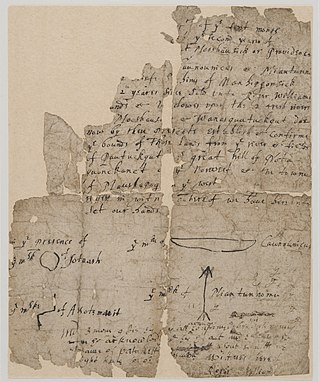
Native American gaming comprises casinos, bingo halls, and other gambling operations on Indian reservations or other tribal lands in the United States. Because these areas have tribal sovereignty, states have limited ability to forbid gambling there, as codified by the Indian Gaming Regulatory Act of 1988. As of 2011, there were 460 gambling operations run by 240 tribes, with a total annual revenue of $27 billion.

Tribal sovereignty in the United States is the concept of the inherent authority of Indigenous tribes to govern themselves within the borders of the United States.

The Bay Mills Indian Community (BMIC), is an Indian reservation forming the land base of one of the many federally recognized Sault Ste. Marie bands of Chippewa.

The Alabama or Alibamu are a Southeastern culture people of Native Americans, originally from Alabama. They were members of the Muscogee Creek Confederacy, a loose trade and military organization of autonomous towns; their home lands were on the upper Alabama River.

Turning Stone Resort Casino is a Native American resort casino owned and operated by the Oneida Indian Nation of New York (OIN) in Verona, New York.
Seminole Tribe of Florida v. Florida, 517 U.S. 44 (1996), was a United States Supreme Court case which held that Article One of the U.S. Constitution did not give the United States Congress the power to abrogate the sovereign immunity of the states that is further protected under the Eleventh Amendment. Such abrogation is permitted where it is necessary to enforce the rights of citizens guaranteed under the Fourteenth Amendment as per Fitzpatrick v. Bitzer. The case also held that the doctrine of Ex parte Young, which allows state officials to be sued in their official capacity for prospective injunctive relief, was inapplicable under these circumstances, because any remedy was limited to the one that Congress had provided.

The Oneida Indian Nation (OIN) or Oneida Nation is a federally recognized tribe of Oneida people in the United States. The tribe is headquartered in Verona, New York, where the tribe originated and held territory prior to European colonialism, and continues to hold territory today. They are Iroquoian-speaking people, and one of the Five Nations of the Iroquois Confederacy, or Haudenosaunee. The Oneida are known as "America's first allies" as they were the first, and one of the few, Iroquois nations to support the American cause. Three other federally recognized Oneida tribes operate in locations where they migrated or were removed to during and after the American Revolutionary War: one in Wisconsin in the United States, and two in Ontario, Canada.

The Indian Gaming Regulatory Act is a 1988 United States federal law that establishes the jurisdictional framework that governs Indian gaming. There was no federal gaming structure before this act. The stated purposes of the act include providing a legislative basis for the operation/regulation of Indian gaming, protecting gaming as a means of generating revenue for the tribes, encouraging economic development of these tribes, and protecting the enterprises from negative influences. The law established the National Indian Gaming Commission and gave it a regulatory mandate. The law also delegated new authority to the U.S. Department of the Interior and created new federal offenses, giving the U.S. Department of Justice authority to prosecute them.

The National Indian Gaming Commission is a United States federal regulatory agency within the Department of the Interior. Congress established the agency pursuant to the Indian Gaming Regulatory Act in 1988.
Lone Wolf v. Hitchcock, 187 U.S. 553 (1903), was a United States Supreme Court case brought against the US government by the Kiowa chief Lone Wolf, who charged that Native American tribes under the Medicine Lodge Treaty had been defrauded of land by Congressional actions in violation of the treaty.
Tribal-state compacts are declared necessary for any Class III gaming on Indian reservations under the Indian Gaming Regulatory Act of 1988 (IGRA). They were designed to allow tribal and state governments to come to a "business" agreement. A compact can be thought of as "negotiated agreement between two political entities that resolves questions of overlapping jurisdictional responsibilities Compacts affect the delicate power balance between states, federal, and tribal governments. It is these forms that have been a major source of controversy surrounding Indian gaming. Thus, it is understandable that the IGRA provides very detailed instructions for how states and tribes can make compacts cooperatively and also details the instructions for how the federal government can regulate such agreements.
California v. Cabazon Band of Mission Indians, 480 U.S. 202 (1987), was a United States Supreme Court case involving the development of Native American gaming. The Supreme Court's decision effectively overturned the existing laws restricting gaming/gambling on U.S. Indian reservations.

In United States law, the federal government as well as state and tribal governments generally enjoy sovereign immunity, also known as governmental immunity, from lawsuits. Local governments in most jurisdictions enjoy immunity from some forms of suit, particularly in tort. The Foreign Sovereign Immunities Act provides foreign governments, including state-owned companies, with a related form of immunity—state immunity—that shields them from lawsuits except in relation to certain actions relating to commercial activity in the United States. The principle of sovereign immunity in US law was inherited from the English common law legal maxim rex non potest peccare, meaning "the king can do no wrong." In some situations, sovereign immunity may be waived by law.
Santa Clara Pueblo v. Martinez, 436 U.S. 49 (1978), was a landmark case in the area of federal Indian law involving issues of great importance to the meaning of tribal sovereignty in the contemporary United States. The Supreme Court sustained a law passed by the governing body of the Santa Clara Pueblo that explicitly discriminated on the basis of sex. In so doing, the Court advanced a theory of tribal sovereignty that weighed the interests of tribes sufficient to justify a law that, had it been passed by a state legislature or Congress, would have almost certainly been struck down as a violation of equal protection.
C & L Enterprises, Inc. v. Citizen Band, Potawatomi Indian Tribe of Oklahoma, 532 U.S. 411 (2001), was a United States Supreme Court case in which the Court held that the tribe waived its sovereign immunity when it agreed to a contract containing an arbitration agreement.
Kiowa Tribe v. Manufacturing Technologies, 523 U.S. 751 (1998), was a case in which the Supreme Court of the United States held that an Indian Nation were entitled to sovereign immunity from contract lawsuits, whether made on or off reservation, or involving governmental or commercial activities.
Inyo County v. Paiute-Shoshone Indians of the Bishop Community, 538 U.S. 701 (2003), was a United States Supreme Court case.

The United States was the first jurisdiction to acknowledge the common law doctrine of aboriginal title. Native American tribes and nations establish aboriginal title by actual, continuous, and exclusive use and occupancy for a "long time." Individuals may also establish aboriginal title, if their ancestors held title as individuals. Unlike other jurisdictions, the content of aboriginal title is not limited to historical or traditional land uses. Aboriginal title may not be alienated, except to the federal government or with the approval of Congress. Aboriginal title is distinct from the lands Native Americans own in fee simple and occupy under federal trust.

The Kewadin Casinos are a set of casinos located in the US state of Michigan. The casinos are owned by the federally recognized Sault Tribe of Chippewa Indians. The primary property is located in Sault Ste. Marie, with additional locations on tribal lands in Christmas, Hessel, Manistique, and St. Ignace.
Franchise Tax Board of California v. Hyatt, 587 U.S. ___ (2019), was a United States Supreme Court case that determined that unless they consent, states have sovereign immunity from private suits filed against them in the courts of another state. The 5–4 decision overturned precedent set in a 1979 Supreme Court case, Nevada v. Hall. This was the third time that the litigants had presented their case to the Court, as the Court had already ruled on the issue in 2003 and 2016.











